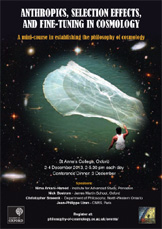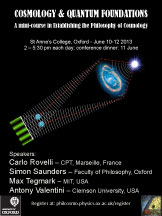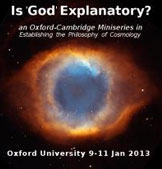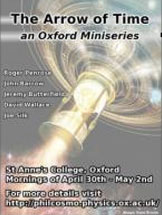Convened by Oliver Pooley
The following seminars will take place at 4.30 p.m. on Thursdays, weeks 1-8, in the Lecture Room of the Philosophy Centre.
Please note the Centre’s NEW ADDRESS: Radcliffe Humanities, Radcliffe Observatory Quarter, Woodstock Road, Oxford OX2 6GG. (This is the old Radcliffe Infirmary building.) The Lecture Room is on the second floor.
Abstracts are posted weekly.
Thu 8 May (week 2): Simon Saunders (Oxford):
Reference to indistinguishable particles, and other paradoxes
Thu 15 May (week 3): Julian Barbour (Oxford)
A gravitational arrow of time
Thu 22 May (week 4): Elise Crull (The Hebrew University of Jerusalem)
Whence physical significance in bimetric theories?
29 May(week 5): Adrian Kent (Cambridge)
A solution to the Lorentzian quantum reality problem
Thu 5 June (week 6): Mike Cuffaro (LMU, Munich)
Reconsidering quantum no-go theorems from a computational perspective
Thu 12 June (week 7): Antony Valentini (Clemson)
Hidden variables in the early universe: quantum nonequilibrium and the cosmic microwave background
Thu 19 June (week 8): Antony Valentini (Clemson)
Hidden variables in the early universe: towards an explanation for large-scale cosmic anomalies




